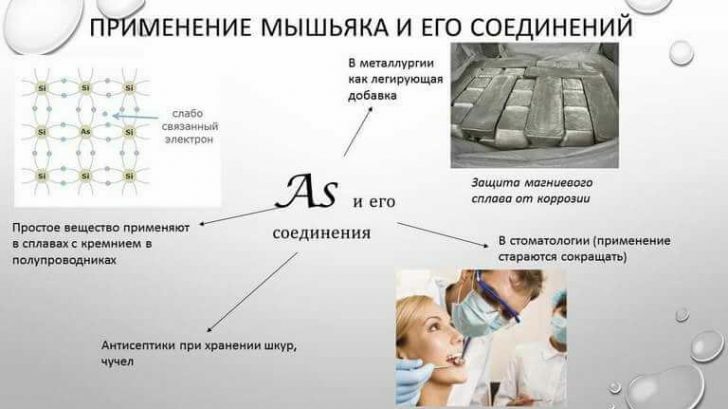What to take when food poisoning?
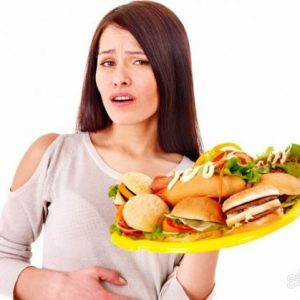 Food poisoning is understood as acute dysfunction of the digestive system caused by the consumption of toxic or substandard( including overdue) food products.
Food poisoning is understood as acute dysfunction of the digestive system caused by the consumption of toxic or substandard( including overdue) food products.
Causes and symptoms of food poisoning
There are two types of food poisoning:
- toxic( non-infectious);
- food poisoning( PTI).
The greatest danger to humans is non-infectious poisoning.They develop when natural toxins( for example, contained in many fungi) or chemical compounds enter the body.
The cause of foodborne infections is food in which a pathogenic microflora is present.Foodborne diseases are a consequence of consumption of overdue products or non-compliance with sanitary and hygienic rules.
Foods that most commonly cause foodborne toxicity :
- cream confectionery;
- sour-milk products( including glazed curds);
- eggs;
- salads with mayonnaise;
- sausages;
- canned food( more often - fish or meat).
If you suspect a non-infectious nature of food poisoning, you must call an ambulance team or immediately deliver the victim to a medical institution.Severe toxic infections require hospitalization of the patient in the infectious disease department, but with mild poisoning can be handled at home.
Important: for any type and severity of poisoning, qualified medical attention is needed for children, the elderly, and pregnant women!
The severity of symptoms of PTI may vary depending on the severity of the poisoning, the age and general condition of the patient, and also on the type of pathogenic microflora.The incubation period is usually very short - its duration is from 2 to 6 hours.
The most frequent clinical signs of foodborne toxic infections are:
-
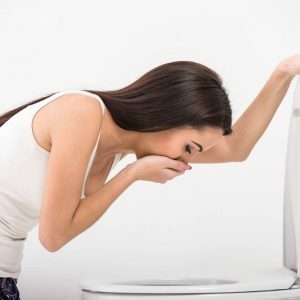 permanent strong feeling of nausea;
permanent strong feeling of nausea; - vomiting( often - multiple);
- an intestinal disorder( diarrhea);
- hypersalivation( increased salivation);
- general weakness;
- malaise;
- cold sweat;
- chills;
- flatulence( active gas generation);
- feeling of heaviness in the stomach;
- stomach pain and / or abdominal area;
- hyperthermia( fever).
The stool of the victim is often fetid, watery and contains mucus( in the form of flakes) and undigested remnants of food.
If timely not to take adequate measures and begin taking the necessary drugs, the symptoms of food poisoning are rapidly increasing.
Important: If suffocation occurs, pain in the liver or kidney, convulsions or confusion - do not try to cope with poisoning at home.Qualified care in a hospital environment is clearly required when suspected of poisoning with mushrooms or domestic canned food.
First aid for food poisoning
First of all, it is necessary to perform gastric lavage to remove the remnants of food poisoning products.To do this, take a half or two liters of water( certainly boiled) and prepare a weak solution of potassium permanganate.
Please note: solution of potassium permanganate must have a pale pink color.It is desirable to strain it through cheesecloth or paper filters to prevent the undissolved crystals from entering the digestive tract( they can cause local burns of the mucous membranes).
Alternatively, 1 tbsp.L.Baking soda( per liter).In the first reception you need to drink from 2 to 6 glasses.The procedure for purifying the stomach should be repeated several times, until the wash water is clean.
The total volume of washing solution is up to 8-10 liters, and the recommended temperature is 35-37 ° C.
Important: should not be used to induce vomiting in pregnant women, persons with severe cardiovascular diseases, or in patients who are unconscious.Contraindication for the compulsory purification of the stomach is the development of seizures.
It is advisable to store vomit or rinse water residues.If hospitalization is required, their laboratory analysis will allow infectious disease doctors to identify the pathogen.
What to take for food poisoning
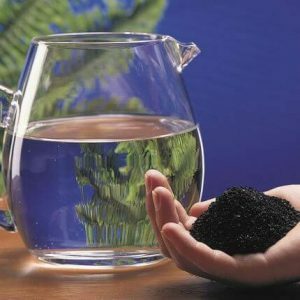 After the procedure for cleaning the stomach for food poisoning should be taken drugs enterosorbents.They bind a variety of toxins, reducing their absorption in the gastrointestinal tract, and facilitating the rapid removal of dangerous compounds from the body.The most famous sorbent is activated carbon.The dose of the drug is determined from the calculation of 1 tablet per 10 kg of weight.In case of severe poisoning, it is advisable to increase the dosage.The sorbent will "work" faster if it is taken in the form of an aqueous suspension.To make it, you need to grind the tablets, and mix them with ½ cup of boiled water.
After the procedure for cleaning the stomach for food poisoning should be taken drugs enterosorbents.They bind a variety of toxins, reducing their absorption in the gastrointestinal tract, and facilitating the rapid removal of dangerous compounds from the body.The most famous sorbent is activated carbon.The dose of the drug is determined from the calculation of 1 tablet per 10 kg of weight.In case of severe poisoning, it is advisable to increase the dosage.The sorbent will "work" faster if it is taken in the form of an aqueous suspension.To make it, you need to grind the tablets, and mix them with ½ cup of boiled water.
White activated carbon, which is an selective sorbent, is more effective.The recommended dose of this drug is half that, ie, an average of 2-4 tablets, depending on the severity of the symptoms.
Other effective pharmaceutical preparations from the group of enterosorbents that can be taken for food poisoning:
- Enterosgel;
- Smecta;
- Lactofiltrum.
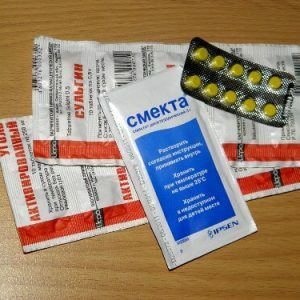 LAN data must be received in accordance with the annotation.Lactofiltrum is produced in the form of tablets.The drug contributes not only the elimination of toxins, but also the normalization of the intestinal microbiocenosis.Smekta and Enterosgel are sold in bags, each of which contains a single dose.
LAN data must be received in accordance with the annotation.Lactofiltrum is produced in the form of tablets.The drug contributes not only the elimination of toxins, but also the normalization of the intestinal microbiocenosis.Smekta and Enterosgel are sold in bags, each of which contains a single dose.
One of the serious complications of poisoning is dehydration( dehydration) of the body, which inevitably develops against a background of repeated vomiting and diarrhea.To eliminate dehydration, it is recommended to consume more liquid( at least 2-3 liters per day).This can be ordinary boiled water, but it is better to take a weak saline solution( 1 tsp per liter) or strong unsweetened tea with food poisoning.Sodium chloride( common salt) promotes fluid retention in the body.Reception of tea and salted water should be alternated.
According to the recommendation of the World Health Organization, the universal solution for eliminating dehydration at home should include:
- table salt - 3 g;
- sugar - 18 g;
- water - 1 liter.
In the pharmacy networks, you can buy rehydration products for oral administration.They are available in the form of powders and granules for breeding.
Pharmacological preparations that can be taken to combat dehydration in food poisoning:
- Regidron;
- Rheosolan;
- Alvogen;
- Rehydrin;
- Oralit;
- Orasan;
- Hydrovit;
- Touring;
- Normohydron;
- Humaine Electrolyte;
- Marathon;
- Glucosolan;
- Citraglycosolane;
- Orsol.
View full list »
Please note : the composition of the above preparations is almost identical and corresponds to the recommended composition of rehydration medications: sodium chloride, sodium bicarbonate or trisodium citrate( preferably sodium bicarbonate), potassium chloride and glucose / dextrose.The cheapest is Hydrovit, but doctors most often appoint Regidron( the composition is better balanced).Children are advised to give Human Electrolyte( in addition to the standard set of extract and oil fennel, cumin extract).
After active vomiting and diarrhea ceased, the intestinal microflora should be normalized.
The most effective drugs for restoring intestinal microbiocenosis:
- Mezim;
- Linex;
- Hilak Forte.
For food poisoning, the liver often suffers because it accounts for the bulk of the work to neutralize toxic compounds.To protect the body, it is recommended to take hepatoprotectors, containing essential phospholipids( for example - Essential Forte).
The use of analgesics is not recommended, as they "lubricate" the symptoms of severe poisoning, making it difficult to diagnose if complications develop.Severe abdominal pains are the basis for an urgent call of "ambulance".
With a significant increase in temperature( above 37.5 ° C) for food poisoning, it is necessary to take drugs that have antipyretic properties - for example, Paracetamol or Ibuprofen.
Do not start antibiotic therapy yourself.They are prescribed only for severe RTIs.In addition, the drug, which is optimal in each case, can be chosen only by a doctor, taking into account the type of pathogenic microflora and its sensitivity to antibacterial agents.
Folk remedies for the control of food poisoning
To slow the absorption of toxins in the digestive tract, you can drink a gelatin solution( 1 packet per glass of water) or potato starch( 6 g per 200 ml).
To minimize the effects of food poisoning, folk medicine recommends taking chicory infusion( 1 tsp of herbs and flowers for 200 ml of boiling water).Phytopreparation is drunk on a third of the glass before meals 3 times a day.
Blackberry berries, brewed in a glass with leaves, and blueberry infusion( 20 g of raw material - 200 ml of boiling water) are excellent in this condition.
An infusion prepared on the basis of harvesting medicinal plants is also effective.On 2 parts of birch buds, 3 pieces of flax seeds are taken from the grass of the grass of the creeping and orchis.3 tbsp.L.Collection pour a liter of boiling water and insist 15-20 minutes.Infusion recommended to drink 50 ml every half hour, until the symptoms of poisoning pass.
With minor food poisoning, it is advisable not only to take sorbents, but also to drink water with honey and dill seeds( 1 cup of honey and seeds per cup of water).
Prompt elimination of toxins is promoted by tea on orange and lemon zest.1 tbsp.L.Dried crusts are brewed 0.5 liters of boiling water and drink two to three weeks instead of regular tea.
An excellent remedy for food poisoning is a decoction of wormwood and yarrow, taken in equal parts.1 tbsp.L.Mix pour a liter of boiling water and take 1 glass 5 times a day.
In severe foodborne infections, decoction from the roots of horse sorrel( 0.5 liters of boiling water per 30 g of vegetable raw material) and infusion on the basis of a mixture of dry rhizomes of sorrel and mountaineer( 50 g per liter) helps.
Traditional medicine recommends also taking tea from camomile flowers with food poisoning, which has antibacterial and anti-inflammatory properties( take 20 g of flowers per 1 liter of boiling water).Well, helps infusion based on a mixture of mint, chamomile and St. John's wort.
What is eaten when food poisoning is
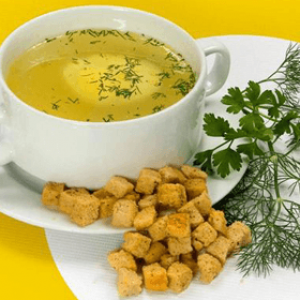 For a speedy recovery after food poisoning, it is necessary to adhere to a restrictive diet for a while and avoid stresses on the body.
For a speedy recovery after food poisoning, it is necessary to adhere to a restrictive diet for a while and avoid stresses on the body.
In the first day, food intake is undesirable, and often - and is impossible with nausea and vomiting.It is recommended to limit yourself to an abundant drink.On the second day, liquid or semi-liquid food is allowed - jelly, porridges cooked on water, and low-fat soups.
Irritating food( smoked meat, pickles, etc.) is excluded, as are carbonated drinks.
In the absence of complications and competent treatment, relief comes in the next few hours.Some symptoms of the effects of PTI( weakness, spastic pain in the intestines and increased gas production) can be observed for several more days.If the case is not very severe, a full recovery usually takes no more than 3 days.
Vladimir Plisov, medical reviewer



